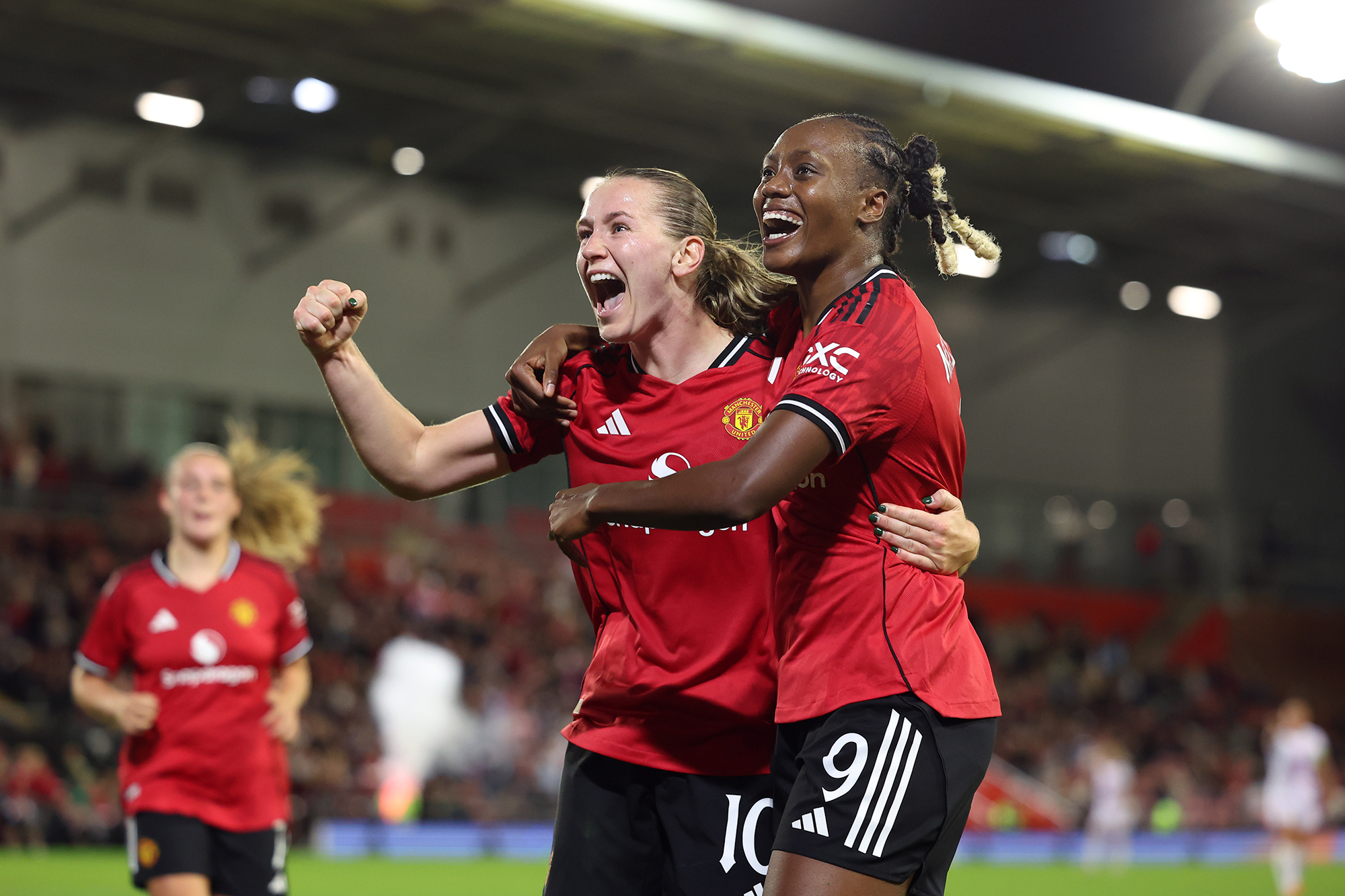Qualification for the Women’s Champions League has historically been harder than the early stages of the competition itself. Wander through its graveyard and see the names of its victims scattered around. Arsenal, Paris Saint-Germain and Wolfsburg have all been casualties of the format in recent years.
Manchester United are painfully aware of this. Their first stab at the competition came in 2023/24 when, having finished second in the league, they were drawn in a two-legged play-off against PSG, who calmly brushed them aside.
Their route this year was even more convoluted after finishing third in the Women’s Super League. They overcame PSV Eindhoven and Hammarby but lost the first leg of their tie in the third qualifying round against Brann 1-0. Despite being the better side, there was a fear that their European bow might end up coming in UEFA’s new secondary competition, the Europa Cup.
Yet a hat-trick from former Brann striker Elisabeth Terland in Thursday’s reverse fixture ensured that for the first time in their history, the women’s side are in the main draw of the Champions League.It shouldn’t be understated what a big moment this is for the club. Manchester United are easy to ridicule, given the way they often behave like they are part of an elaborate women’s football mockumentary.
There was the time when Erik ten Hag reportedly built a wall between the men’s and women’s training pitches. There was the time last season when they were moved out of their state-of-the-art training facility and into temporary cabins to make room for the men’s team. There’s the David Brent-esque manner in which manager Marc Skinner fistbumps journalists at press conferences.
They even managed to lose their boots on the way to Norway for their first leg, leading to the kind of financial profligacy that must have left Sir Jim apoplectic as they were forced to purchase new ones ahead of the match.
The numerous missteps come under extra scrutiny given that United were late to the party when it came to the women’s game. An unofficial team was affiliated to the club in 2001 but was shuttered four years later when the Glazers took over. At the time they said it was never their “intention to become involved in women’s football at a high level”.“We have always made it clear the ladies’ and girls’ section was about community partnership and education rather than establishing a centre of excellence,” said a statement at the time.
“Ultimately the hope is the boys will progress to the first team. So naturally more resources are put into that area because it is our core business.”
There was a suspicion that the club’s revival in 2018 had far more to do with the optics of not having one than a rediscovered feminist esprit. They parted ways with their first manager Casey Stoney in 2021 over disagreements about the level of investment. A glance at a team sheet this season shows that not much has changed under INEOS’s ownership. Against Brann, they only had seven substitutes from a possible twelve, two of whom were goalkeepers. Ratcliffe has repeatedly publicly made clear in both his statements and actions that he has little interest in how the women’s team do.
Despite that, good players keep turning up at Manchester United. After right-back Jayde Riviere scored a rocket against London City Lionesses, she defiantly turned to the camera and tapped the badge. The reality is that tens of thousands of little girls across the world grew up watching Manchester United and some of them turned out to be professional footballers. The lure of the brand remains tantalising.
Newsletters
Choose the newsletters you want to receive
View more
For information about how The Observer protects your data, read our Privacy Policy
That loyalty to the club also pushes a siege mentality. Skinner regularly takes a bolshy attitude with the media when defending both his position at the club – he has not been historically popular with fans – and the actions taken by his superiors. When he said last week that London City Lionesses had probably spent more in one summer than he had in his entire career, it was closer to a point of pride when it should have been a red flag to the Manchester United ownership about the financial direction the women’s game is taking. The club’s approach oscillates between delusional and baffling, but always entertaining.
As a group, the players appear to be genuinely close, as shown by the touching tributes that have been paid after Ella Toone lost her father and left-back Anna Sandberg lost her mother.
Maya Le Tissier has developed into a formidable captain, Melvine Malard looks to have found the form that once made her one of the most exciting prospects in Europe, and Jess Park’s move across Manchester is already paying dividends.
They have made the past three FA Cup finals, have finished in the top three of the WSL twice in three years, and can now add Champions League football to their résumé. It might be a circus, but it is worth buying a ticket.
Given the lack of investment, a squad as thin as theirs will struggle with the strain of competing on four fronts. They were handed a tough draw coming from the lowest-ranked pot as debutants, as the UWCL moves to the same league format as the men’s competition. They will play OL Lyonnes (the artist formerly known as Lyon), PSG and Vålerenga at home, with games against Atlético Madrid, Juventus and Wolfsburg away.
It has been a positive start to the season with comprehensive wins over Leicester City and London City Lionesses. That will be tested over the next couple of weeks as Arsenal visit today before Chelsea make the same trip in almost a fortnight’s time. Both of those teams are a level above when it comes to the investment and care taken in them. The biggest shame for the group at United would be if the successes they are managing are taken as evidence that the ownership are doing enough.
That is patently untrue. The successes are still worth celebrating, however, for a team who continue to fight even if their own club stacks the odds against them.
Photograph by Matt McNulty/Getty Images



